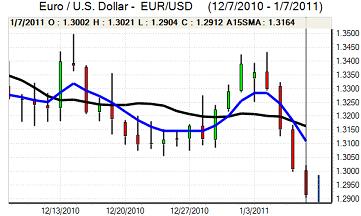EUR/USD
The Euro was unable to overcome resistance above 1.30 ahead of the US payroll data on Friday and drifted weaker to the 1.2950 area on expectations of a firm data set.
In the event, the headline December employment gain was weaker than expected at 103,000 following an upwardly-revised 71,000 previously. There was a negative impact from adverse weather conditions as construction employment fell, but the data still fell short of expectations. In contrast, the household labour survey was stronger than expected as unemployment fell to 9.4% from 9.7% with a sharp increase in employment.
There should still be a mood of cautious optimism surrounding the economy despite the payroll data. Fed Chairman Bernanke stated that growth was still too weak to lower unemployment and there is no evidence that the Fed is looking to adjust the quantitative easing programme.
The Euro gained ground immediately following the data, but there was a rapid reversal as deteriorating Euro sentiment offset the payroll impact. There was a fresh widening in peripheral yield spreads during the session with a particular focus on Portugal.
Investors are expecting a poor set of auctions this week and there was also weekend speculation that Germany is pushing Portugal to apply quickly for EU support. There has also been no resolution of the Belgian debt political crisis which is also having a negative impact. The seriousness of the situation was illustrated by ECB Chairman Trichet’s calls for further aggressive action by EU leaders.
The Euro weakened to fresh four-month lows near 1.29 late on Friday and was unable to secure a recovery in Asia on Monday with the sharpest weekly decline for two years.

Source: VantagePoint Intermarket Analysis Software
Call now and you will be provided with FREE recent forecasts
that are up to 86% accurate * 800-732-5407
If you would rather have the recent forecasts sent to you, please go here
Yen
The dollar advanced to highs above 83.60 against the yen ahead of the US payroll data on Friday with markets expecting a stronger than expected outcome. The weaker than expected data quickly triggered a reversal with the US currency dipping to below 83 before stabilising.
There will be some scaling back of excess optimism surrounding the US economy, but there will still be expectations of a solid performance which should maintain firm yield support for the dollar.
The Chinese trade surplus was lower than expected for December which may trigger some caution over global demand and also lessen selling pressure on the Japanese currency. Japanese markets were closed on Monday and, although the yen remains dependent on weakness elsewhere to make progress, the Euro was at a four-month low.
Sterling
Sterling tested support below 1.5450 against the dollar on Friday, but advanced strongly following the US economic data with a peak around 1.5575. Significantly, the UK currency was able to hold the bulk of its gains even as the dollar gained strongly against the Euro. In this environment, Sterling strengthened to fresh four-month highs below 0.83 against the Euro.
The UK currency will continue to gain some degree of near-term protection from fears over a renewed debt crisis within the Euro-zone. The situation will reverse rapidly if there are fears over the UK banking sector.
On a near-term view, inflation and any Bank of England response will be an important focus ahead of the MPC policy decision on Thursday. Markets will be expecting policy to be unchanged, but there will also be some speculation that the bank could move closer to an interest rate increase and this will tend to support Sterling during the next few days and it held firm in Asian trading on Monday.
Swiss franc
The Euro has remained under pressure against the franc with further tests of support below 1.2450. The dollar has maintained a firm tone, but general franc strength on the crosses prevented any challenge on resistance above 0.97.
The familiar theme of Euro-zone vulnerability has continued to dominate markets and any further widening of yield spreads would tend to put further upward pressure on the Swiss currency.
There has been increased unease over the situation from within Swiss industry groups, but the National Bank will find it difficult to justify intervention unless deflation fears return.

Source: VantagePoint Intermarket Analysis Software
Call now and you will be provided with FREE recent forecasts
that are up to 86% accurate * 800-732-5407
If you would rather have the recent forecasts sent to you, please go here
Australian dollar
The Australian dollar found support on dips to below 0.9920 against the US currency on Friday and the worse then expected employment data pushed it to a high near 0.9990.
The US data, allied with a lower than expected Chinese trade surplus, will tend to dampen optimism towards the global economy and limit carry trades.
Domestically, the latest retail sales report was in line with expectations with a 0.3% November increase, but the PMI construction index remained blow 50 and all the PMI indices were below the expansion threshold for December which will tend to dampen confidence in the economy and also limit Australian dollar support.



